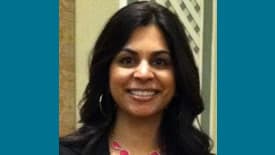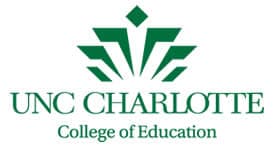Cato College of Education

Counseling professor invited to White House-called conference
College of Education professor Sejal Foxx will represent UNC Charlotte at an upcoming event to strengthen school counseling and college advising; it is being convened by the White House.
She will join delegates from 35 states representing K-12 schools, nonprofit organizations, research interests, policymakers and other stakeholders in an effort to increase the number of traditionally underserved students succeeding in post-secondary education.

Education study highlights tactics to teach vocabulary to struggling readers
New research co-authored by College of Education scholars is illuminating the path to teaching academic vocabulary words to students with learning disabilities.
Published in the journal Teaching Exceptional Children, the study reads like an instructional manual for teachers interested in expanded in-class vocabulary training. It examines which words can do the most to help struggling readers, how to effectively teach those words and how integrate the instruction into subject-matter class discussions.

UNC Charlotte to host acclaimed international water research competition
UNC Charlotte has been selected to host the United States leg of a competition for one of the world’s most prestigious awards in water-related research. The Stockholm Junior Water Prize is presented to one high school student annually for research in water and sustainability issues. In an effort led by the Center for STEM Education, UNC Charlotte bested proposals from universities across the country to host the competition through 2018.

Martin receives award for QM-certified, redesigned online course
Florence Martin, an associate professor in the College of Education’s Instructional Systems Technology program, is a 2015 recipient of a Crystal Award from the Association for Educational Communications and Technology (AECT) Division of Distance Learning.
The honor is for “an innovative and outstanding multimedia-based distance learning course or distance learning project,” according to the AECT. She will receive the Crystal Award formally during the 2015 AECT convention in Indianapolis on Nov. 6.

New program prepares learners to embrace future of educational technology
A recently launched online program available through the UNC Charlotte College of Education will train the next generation of virtual teaching and learning system architects and managers.

STEM Education Center to hold open house
The Center for STEM Education will host an open house from 11 a.m. to 2 p.m., Wednesday, Sept. 30, in the College of Education, Suite 222.
Attendees can meet center staff and educational collaborators and learn more about the center’s programs. Light refreshments will be served.
For more information, call 704-687-8816 or email Taylor Rauschenberg at ftrausch@uncc.edu.

Education professor named Foreign Language Teacher of the Year
Scott Kissau, an associate professor of foreign language education in the Department of Middle, Secondary, and K-12 Education, was named Foreign Language Teacher of the Year in higher education by the Foreign Language Association of North Carolina.
“Dr. Kissau distinguished himself from the other candidates by immersing himself in the education of languages and cultures and by demonstrating his in-depth involvement with growing and supporting world language teachers,” said Foreign Language Association of North Carolina (FLANC) Awards Chair Delynda Ramirez-Carter.

Back-to-back ‘Live Wire’ segments scheduled for Aug. 20
Starting at 2 p.m., Aug. 20, “The Live Wire,” Inside UNC Charlotte’s streaming webcast, will feature two programs. In the first segment, Bret Wood, clinical coordinator in the University’s athletic training program, will explain why one of the most dangerous injuries athletes face also can be one of the most complex to diagnose and manage.

Education in Mecklenburg county topic for Aug. 13 ‘Live Wire’
Bill Anderson, special assistant to the dean for community relations in the College of Education, and Eric Davis, a member of Charlotte-Mecklenburg Schools and North Carolina State Boards of Education, will be the guests on the Thursday, Aug. 13, edition of “The Live Wire,” Inside UNC Charlotte’s streaming webcast, which airs at 2 p.m.

High school students share research at summer symposium
Deep underground in a basement auditorium, a high schooler is teaching about nanoparticles. It’s the end of a hot summer spent in cool laboratories for the fortunate juniors and seniors chosen for the research experience at UNC Charlotte. Delivering their presentations marks the culmination of more than a month of study for the six high school students, who were paired with professors to work on complex scientific questions.